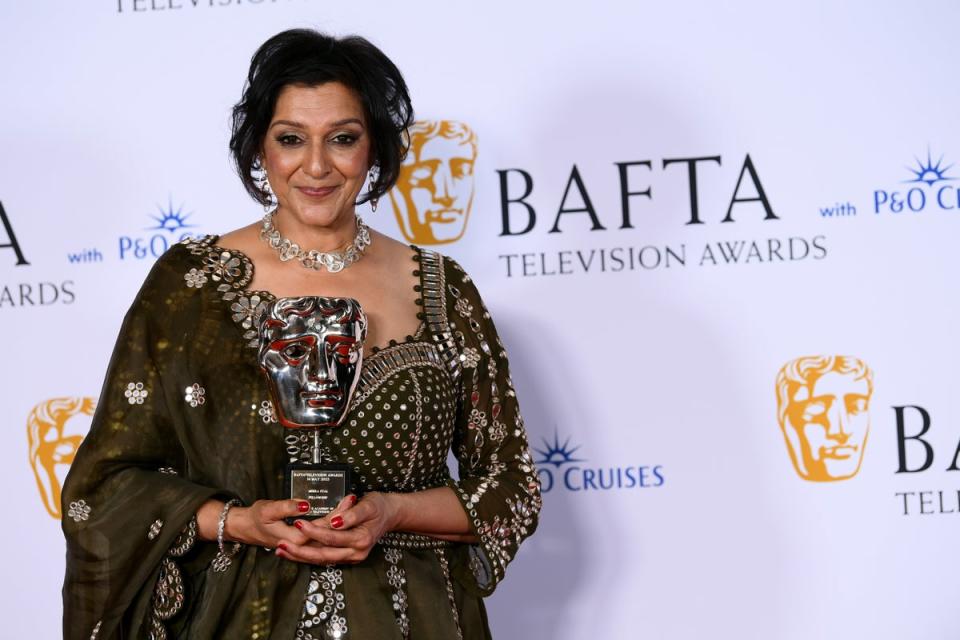Meera Syal compares on-screen diversity to ‘window dressing’ without structural change
Meera Syal has said that on-screen diversity is only “window dressing” if things are not “changing fundamentally in the power structures”.
The Goodness Gracious Me star reflected on her experiences as a British Asian woman in the film and TV industry for her Alternative MacTaggart discussion at the Edinburgh TV Festival on Friday (25 August).
During the conversation, the actor and writer told annual festival’s executive chair Fatima Salaria that she started writing after being only offered roles to play “the usual parade of victim of arranged marriage, sister of a victim of an arranged marriage, mother of a victim of an arranged marriage”.
“Now of course, it’s very different: mother of terrorist, grandmother of terrorist,” she added.
Syal, 62, added that she has been “blessed” in recent years with “interesting” roles and that she feels on-screen representation has improved.
“I think in the casting things really are changing and that’s fantastic for all of us but I’m worried that it’s window dressing when things aren’t changing fundamentally in the power structures,” she said.
Syal argued there is a “glut” of individuals coming through in the TV industry on entry-level training schemes who then get stuck in a “huge bottleneck” which prevents them rising through the ranks.
She added: “How do you get those people there to actually get their hands on the grit, the dirt, to learn their craft, to have the room to make mistakes, like everyone needs? We do have a way to go but it’s got to be collaborative and that’s why I’m coming back to the mentors.
“I don’t see it as a defeat if you have to go to somebody more powerful who may not be the same culture as you to go, ‘I need you to open this door.’ Maybe that is a joint responsibility.”

Syal rose to fame as one of the creators and stars of BBC sketch comedy show Goodness Gracious Me, which originally aired on BBC Radio 4 in the late 1990s and was later televised on BBC Two. It ran for three series, and also helped propel the carers of Sanjeev Bhaskar, Nina Wadia and Kulvinder Ghir.
Reflecting on how she got her break with Goodness Gracious Me, Syal said it was “weirdly easier” in the 20th century to have a story which was more diverse commissioned then as there was a “hunger” to tap into unexplored stories.
“I think it was a turning point in all our careers in terms of visibility and we all went on to do other things but I think we were all quite sad that we weren’t nurtured after we’d had this huge success,” Syal said.
She recalled seeing fellow creatives from other popular shows at the time getting mentored, adding: “I think that was my disappointment, but I think we brought something really wonderful to the BBC and we would have loved to do more.”
Asked is she thinks the cast were not brought on to future projects together afterwards due to it being a potential “risk” for the broadcasters, Syal agreed that this might have been the case. “It’s those programmes that actually changed the landscape, if you’ve got the ovaries to do it,” she said.
Launched in 1997, the Alternative MacTaggart lecture offers a platform for alternative voices in the television industry. It has previously been delivered by actor Rose Ayling-Ellis, presenter Jameela Jamil, politician Jeremy Corbyn and US TV host Jerry Springer.
This year’s MacTaggart Lecture was delivered by Louis Theroux on Thursday (24 August). During his speech, Theroux discussed a perceived “atmosphere of anxiety” in the TV industry, but said that playing it safe had “never worked for me”.
Additional reporting by Press Association.


